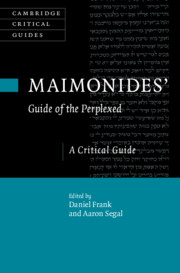Book contents
- Maimonides’ Guide of the Perplexed
- Cambridge Critical Guides
- Maimonides’ Guide of the Perplexed
- Copyright page
- Contents
- Contributors
- Introduction
- Part I Form
- Part II Human Beginnings
- Part III The Creator
- Part IV The Created
- Part V Human Finitude
- Chapter 11 Maimonides’ Critique of Anthropocentrism and Teleology
- Chapter 12 Maimonides and the Problem(s) of Evil
- Part VI Human Ends
- Bibliography
- Index
- Cambridge Critical Guides
Chapter 12 - Maimonides and the Problem(s) of Evil
from Part V - Human Finitude
Published online by Cambridge University Press: 18 June 2021
- Maimonides’ Guide of the Perplexed
- Cambridge Critical Guides
- Maimonides’ Guide of the Perplexed
- Copyright page
- Contents
- Contributors
- Introduction
- Part I Form
- Part II Human Beginnings
- Part III The Creator
- Part IV The Created
- Part V Human Finitude
- Chapter 11 Maimonides’ Critique of Anthropocentrism and Teleology
- Chapter 12 Maimonides and the Problem(s) of Evil
- Part VI Human Ends
- Bibliography
- Index
- Cambridge Critical Guides
Summary
One of the distinctive features of Maimonides’ approach to the problem of evil is that he treats the problem not only from a metaphysical viewpoint, but from a psychological one as well. He blends philosophical, biblical, talmudic, and midrashic insight with psychological acumen, just as he does in his writings and communications to beleaguered communities and individuals. In the area of theodicy, then, he tackles two sorts of issue: (1) How God could allow any evil; how, in particular, God could allow the righteous to suffer and the wicked to prosper and (2) How human beings should experience and cope with suffering and death, and behave in its presence. For example, they need to ask themselves whether their personal situations affect how they assess the amount of evil in the world, whether what they regard as evils are truly evils or instead just contrary to their interests, whether they are blaming God for evils they caused out of their own free will, and what they can do to better their condition. Maimonides sometimes commutes between the psychological and philosophical dimensions of the problem.
- Type
- Chapter
- Information
- Maimonides' Guide of the PerplexedA Critical Guide, pp. 223 - 244Publisher: Cambridge University PressPrint publication year: 2021
- 2
- Cited by

